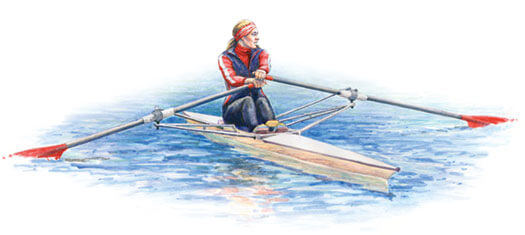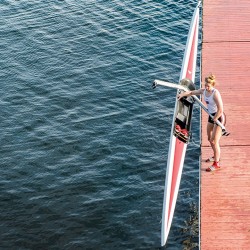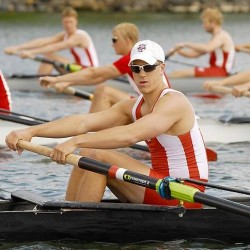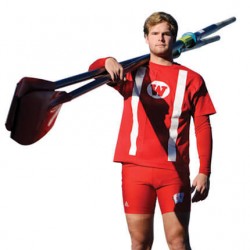Wisconsin: Where I Row
“You’re tall; you look strong. Can you swim?”
“Where do I sign?” was my spontaneous response. And just like that, a question asked during college orientation suddenly changed the trajectory of my life.
I never think about my time at Wisconsin without thinking about rowing. It’s difficult to remember other facets of my life as a student, as I was so immersed in the sport. I strive to remember the good times on State Street, the football games, walking up and down Bascom Hill, attending classes, eating in the cafeterias, dorm life, and climbing stairs in Van Hise — but somehow, every one of those images comes back to me with some vision of rowing superimposed. The team became my family away from home, and that’s what I needed.
Even now, nearly eighteen years after graduation, my waking thought is, “What does the water look like today?” If it’s [like] a mirror, and I’ve overslept, I grimace about a wasted opportunity, and I plot how to get in a row after sending my daughter off to school, or in between meetings at work and emails that beg for answers. If I’m lucky enough to have awoken early, I own the lake, and the loons and eagles are my audience. I’m transported into a world where I command what happens for the rest of the day.
Because I row.
It wasn’t always so glamorous. At the fall recruiting meeting, when our UW coach told 120 of us that the person on our left and the person on our right wouldn’t be there come the end of the spring season, I believed her. I also believed that I would be there. I was right. The twenty of us who survived paid a great price, but we came away with so much more.
When she warned us that we’d get blistered hands, I believed — and sometimes the blisters covered half of my palms. When it came time to make team cuts, I was thankful to be five feet ten. When we were told to run stadiums, we did, and, for the next week, I used a bathroom stall for the disabled, so I could use the steel handrails to lower myself and my aching muscles. When I could only see a silhouette of the rower in front of me, I just closed my eyes and trusted that we’d pull ourselves forward.
When ice took our lake captive, we transformed the boathouse into our winter palace. When spring storms unleashed winds that broke up the ice-lined shores, we watched the water’s unveiling. And when we were finally issued our first race uniforms, bearing bold red and white, I was awestruck with pride.
Rowing was all consuming and obsessive — and oppressive at times. Get a group of rowers together, and they demonstrate an innate desire to connect. Anyone who doesn’t row soon feels excluded. These conversations, however, are lifegiving to the rower: they validate the hours, weeks, months, or even years and decades spent in a boat going backward. Conceited? Most definitely. Rewarding for the rower? Unquestionably.
Since my graduation, rowing has led me to the Rhine River in Germany, upstate New York, Philadelphia, Idaho’s Pettit Lake, countless races, three coaching positions for rowing and other sports, and a network of like-minded people. Rowing has given me confidence that I couldn’t achieve or find anywhere else.
My most important lesson from rowing came from fellow rower Biz Smith in 2000, when we were involved in pre-Olympics training. When I asked her to share her best advice, she said, “You can always do another piece” — referring to a race simulation that crews do to build endurance. I used that phrase to trick my mind into thinking that I was fresh out of the gate each time — that I was never so tired that I couldn’t do another piece. That mindset has served me well in all aspects of my life, and I share it with people every chance I get.
Rowing changed my life, how I thought I could live it, and what I thought I could do with it. And all because I am tall and had learned to swim.
Charil Reis ’95 awakens every day to a captivating view of Crescent Lake in Rhinelander, Wisconsin.
Published in the Spring 2013 issue




Comments
John Vegter March 8, 2013
I love this piece it brings back wonderful memories of Madison, Lake Mendota and all my rowing team mates. I rowed from “68 to ’72 with Randy Jablonic as my coach. The inner strength I have today was established when I was a rower, “you can always do another piece”. I still row my single scull on our small lake in the mornings when I can always very peaceful and a time thinking back of all the great memories. A special time of my life that I will always cherish. Johnny V. as Jabo liked to call me.
Paul Crave March 8, 2013
Wonderful article. Randy Jablonic (Jabo) had a great run at U.W.
I remember chasing him down in a woods, running him down over snow drifts along the lake after he had a 15 min start. It took over an hour to catch up with him. I was always impressed with his example and with his willingness to suffer and sacrifice with his crew. I only rowed for one year, but it was great. I was a transfer student and wanted to be involved in something that would keep me in shape. My brothers thought I should go out for the football team and try for a tight end position. I ended up going with the crew. I ran out of eligibility after that one year, ’85. I really enjoyed the guys. Not so much riding out east stuffed in a van with a bunch of 6’6″ guys and all their gear.
Wonder if they still run to the “End of the World”. I remember doing that 10 mile run in under an hour, good for a dinner for two anywhere in Madison, compliments of the coach.
Larry Schmitt March 8, 2013
Reading these memories of experiences with the UW Crews warms my heart and refreshes memories of my experience with Men’s Crew ’54-58 under Dick Tipple and Norm Sonju. I am confident that it allowed me to succeed at UW with a BS and an MD. What a fantastic push to go as hard as you can for as long as you can. It is a life-long advantage as the coaches, at widely spaced times, stated. Such a life enriching experience. It kept me in college and enhanced my life in so many ways that I do not recognize. It may have saved my life. My house mate, Brian Bagley, urged me to go with him to a winter work out in the rowing room. An inoculation that lasted a lifetime promoting optimism.